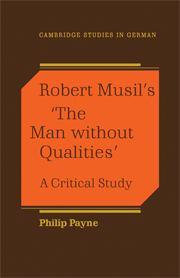Book contents
- Frontmatter
- Contents
- Preface
- A note on the translation of quotations and on references
- Part I Aspects of Musil's life and works
- Part II ‘The Man without Qualities’
- 4 Introduction
- 5 A critical approach to the structure
- 6 An investigation of two major themes
- 7 Moosbrugger – a study in applied subjectivity
- 8 Ulrich as ‘Man without Qualities’
- 9 Review of The Man without Qualities from the perspective of the narrator
- 10 Ulrich and Agathe
- Epilogue
- Notes
- Bibliography
- Index
9 - Review of The Man without Qualities from the perspective of the narrator
Published online by Cambridge University Press: 04 August 2010
- Frontmatter
- Contents
- Preface
- A note on the translation of quotations and on references
- Part I Aspects of Musil's life and works
- Part II ‘The Man without Qualities’
- 4 Introduction
- 5 A critical approach to the structure
- 6 An investigation of two major themes
- 7 Moosbrugger – a study in applied subjectivity
- 8 Ulrich as ‘Man without Qualities’
- 9 Review of The Man without Qualities from the perspective of the narrator
- 10 Ulrich and Agathe
- Epilogue
- Notes
- Bibliography
- Index
Summary
‘Gewalt’ and ‘Liebe’
Perhaps the most fundamental notion of The Man without Qualities as a whole is that, in its simplest and most original form, life can be seen as the intertwining of two elemental principles: ‘Gewalt’ (‘violence’) and ‘Liebe’ (‘love’). This conception is expounded most fully in Part II, Chapter 116. Here Ulrich is undergoing the central transition in attitude which we have just examined. Ulrich sees with sudden conviction: ‘that life is a rough and dire condition in which one cannot afford to give too much thought to the morrow since one has one's hands quite full enough with today’ (591). This, as we have seen, is incompatible with his earlier attitude to life. He now sees that it was folly to consider that any observer could be completely impartial and his insights totally objective. Life spawns ideas, not ideas life. Ulrich reproaches himself for his shortsightedness earlier: ‘How could a good observer fail to see that this life-mix of concerns, urges and ideas, which at best exploits ideas in order to justify itself or uses them as a stimulus, has of its very nature the effect of shaping and binding [the ideas] which take from it their spontaneous movement and their limits’ (591). The narrator follows Hume who argued that, whenever one examines a thought closely, one finds the emotion in which it originated. There is no such thing as disinterested research; all discoveries are predicated on a person's interest in the object of his or her enquiries.
- Type
- Chapter
- Information
- Robert Musil's 'The Man Without Qualities'A Critical Study, pp. 167 - 181Publisher: Cambridge University PressPrint publication year: 1988



